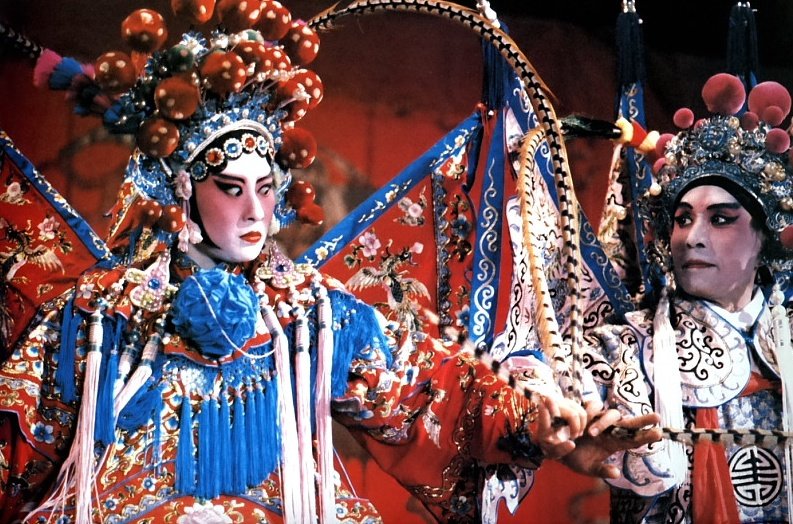
Directed by Li Hanxiang, also the director of Diau Charn of the Three Kingdom, the blockbuster's cast all appear in roles that correspond to their gender, as in Marriage of the Fairy Princess (1955) and To Borrow A Wife (1958).Ĩ.00. The two stars play an innocent innkeeper’s daughter and a playboy-emperor whose chance meeting yields a tragic love story. The Kingdom and the Beauty (1959): Shaw Brothers’ first Huangmei opera film, featuring Lin Dai (foreground) and Zhao Lei, both of Diau Charn of the Three Kingdoms (1958). Xiao Juan changed her screen name to Ivy Ling Bo around 1963 and went on to become a superstar of the 1960s Mandarin screen in the Chinese diaspora.ħ.00. Xiamen movies have been variously called Minnanhua, Amoy or Fujianese films.
#CHINESE OPERA MOVIE MOVIE#
This publicity shot of Xiao Juan ( Sing Dao Daily, June 12, 1958) promotes her as the “New Xiamen Movie Queen” and the “Number One Actress In Xiamen Movies.” It announces she's recently completed four films. Produced by Great Wall, it has “Subtitles For Every Line So That Everyone Can Sing Along.” The tagline is, “Borrowing Rice And Money Is A Commonplace Occurrence/Who In The World Borrows a Wife!” The film stars Shi Hui and Fu Qi, two of the biggest names from the leftwing camp of Hong Kong’s postwar film industry.Ħ.00.
#CHINESE OPERA MOVIE FULL#
Film ad for To Borrow a Wife (1958), the first Hong Kong-made Huangmei opera film: According to the film ad ( Sing Dao Daily, a Hong Kong Chinese newspaper, May 17, 1958), this color feature has been playing to a full house for days. The butterfly lovers, Shanbo (right) and Yingtai, reunite in heaven. He soon discovers, much to his distress, that Yingtai’s father has already betrothed her to someone else. Here they meet in Yingtai’s boudoir where Shanbo plans to ask for her hand. A Cantonese version of the Liang-Zhu story in a Hong Kong production features two well-known opera divas, Ren Jianhui (right) and Fang Yanfen, also Cantonese film stars, who play Shanbo and Yingtai respectively. The Tragic Story of Liang Shanbo and Zhu Yingtai (1958)Ĥ.00.

The subtitle-Liang Shanbo and Zhu Yingtai-is the last line of chorus for film’s finale. The Transmogrification to Butterflies Act: Here Shanbo (right) and Yingtai celebrate their reunion as eternal butterflies in heaven. The film set has a painted backdrop, as in traditional opera. Like Yingtai, Yin Xin is also in male disguise. The 18-li Farewell Act: Yin Xin (with pink sash) and Si Jiu admire the lakeside scenery, while their respective masters, Yingtai (in red) and Shanbo, watch from behind.

Here Shangbo and Yingtai (in male disguise) study together at school.Ģ.01. The film has an all-female cast, typical of Shanghai opera. Adapted from a Shanghai opera of the same name, it stars the original cast, including Yuan Xuefen (right) and Fan Ruijuan, who respectively play Liang Shanbo and Zhu Yingtai.

Produced by Shanghai Film Studio, this Shanghai opera film is New China’s first color feature. Images from the film Liang Shanbo and Zhu Yingtai (1954)Ģ.00. In English writing, the terms-Shanghai opera, Shaoxing opera and Yueju (Yue opera)-are often used interchangeably.Ģ.00-2.02. Flared pantaloons, pleated at the knees, are a sartorial convention of Huangmei opera. Characters here are peasants and so wear shirt and trousers. Later the main show, a full-length stage production, was held at the state-of-the-arts theatre. Another short act by the same troupe, part of the 2004 Macao Festival of the Arts. She has two eunuchs attending her to her left are two palace maids. An excerpt from Yang Guifei: The Imperial Concubine performed by a Huangmei opera troupe from Anhui Province, PRC, at the St.

Huangmei opera films and gender by Tan See-Kam JUMP CUT


 0 kommentar(er)
0 kommentar(er)
